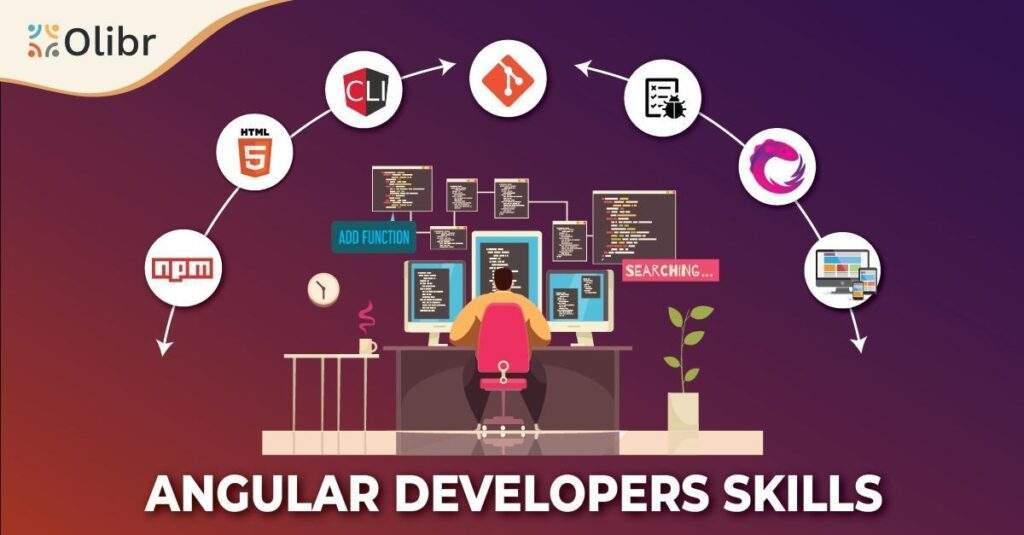How to Hire Angular Developers? Key Skills and Knowledge to Look for

Introduction
Angular is a widely used and powerful JavaScript framework for building modern web applications. As technology continues to advance, businesses are increasingly recognizing the need for skilled Angular developers to create robust and interactive web applications. However, hiring the right Angular developer can be a challenging task, given the rapid evolution of the framework and the ever-changing web development landscape. This blog aims to guide you through the process of hiring Angular developers by highlighting key skills and knowledge to look for in candidates.
Key Skills and Knowledge to Look for While Hiring Angular Developers
Understanding Angular and Its Ecosystem
Before diving into the hiring process, it’s crucial for the hiring manager or recruiter to have a fundamental understanding of Angular and its ecosystem. Familiarize yourself with Angular’s features, architecture, and versions. This knowledge will enable you to ask relevant questions during interviews and better assess candidates’ suitability for the role.
- Essential Technical Skills
When evaluating Angular developers, keep an eye out for the following essential technical skills:
a. Proficiency in JavaScript/TypeScript: Angular is built on TypeScript, a superset of JavaScript. A solid understanding of JavaScript and TypeScript is essential for developing Angular applications effectively.
b. Angular Concepts: Candidates must be well-versed in core Angular concepts, such as modules, components, directives, templates, services, and dependency injection.
c. HTML and CSS: Familiarity with HTML and CSS is vital as Angular applications rely on these technologies to structure and style content.
d. Reactive Programming: Angular heavily uses reactive programming paradigms with RxJS. Look for developers who understand observable streams and can efficiently manage data flow and state.
e. RESTful APIs and HTTP: Angular applications often interact with back-end services through RESTful APIs. Ensure candidates have experience working with HTTP requests and APIs.
f. Unit Testing: Skilled Angular developers write unit tests to ensure code quality and robustness. Knowledge of testing frameworks like Jasmine and Karma is crucial.
3. Experience and Projects
Assessing a candidate’s hands-on experience is vital to gauge their practical knowledge and abilities. Look for developers with a portfolio that includes Angular projects they have worked on. Additionally, consider the complexity of the projects, their contribution to the team, and the impact on the final product.
4. Problem-Solving and Analytical Skills
Angular developers should possess strong problem-solving and analytical skills. During the interview process, present real-life scenarios or code challenges for candidates to solve. This will help you gauge their ability to approach problems logically and find efficient solutions.

5. Familiarity with Build and Deployment Processes
A proficient Angular developer should understand build tools like Angular CLI and Webpack and have experience with deploying Angular applications to various hosting environments.
6. Version Control and Collaboration
Version control is essential for collaborative software development. Ensure the candidates are proficient in using Git, as it’s the most widely used version control system in the industry.
7. Continuous Learning and Adaptability
Technology, including Angular, evolves rapidly. Look for developers who demonstrate a willingness to learn, keep up with industry trends, and adapt to changes in the framework.
8. Soft Skills
Apart from technical expertise, soft skills are equally important for a successful team member. Effective communication, teamwork, and the ability to work well under pressure are crucial attributes to look for in potential Angular developers.
9. Assessing Culture Fit
Hiring a developer who aligns with your company’s culture and values is vital for a harmonious and productive work environment. Ensure that the candidate’s values and work ethics match the company’s culture.
Tips to Hire Angular Developers
Hiring Angular developers can be a challenging process, but by following these tips, you can increase your chances of finding the right candidates for your team:
- Clearly Define the Job Requirements: Before you start the hiring process, make sure you have a clear and detailed job description that outlines the specific skills, experience, and responsibilities required for the role. This will help attract candidates with the right qualifications.
- Look for Angular Expertise: Angular is a complex framework, and it’s essential to find candidates with a strong understanding of Angular concepts, best practices, and architecture. Look for candidates with relevant experience and projects that demonstrate their proficiency with Angular.
- Review Portfolios and GitHub Profiles: Ask candidates to share their portfolios and GitHub profiles to assess their previous work. This will give you insight into the quality of their code, the complexity of projects they’ve worked on, and their ability to handle real-world challenges.
- Conduct Technical Assessments: Consider conducting technical assessments or coding challenges to evaluate the candidates’ problem-solving skills, Angular knowledge, and coding abilities. These assessments can be in the form of online coding tests, take-home assignments, or pair programming sessions.
- Check for Collaboration and Communication Skills: Angular developers often work in teams, so it’s essential to assess a candidate’s ability to collaborate effectively and communicate clearly. Soft skills play a significant role in the success of a development team.
- Utilize Online Platforms and Job Boards: Leverage online platforms, such as LinkedIn, Stack Overflow Jobs, GitHub Jobs, and other specialized job boards to reach a broader audience of Angular developers actively seeking opportunities.
- Consider Remote and Freelance Options: Don’t limit your search to local candidates. Remote developers or freelancers can offer valuable expertise and flexibility. With tools for remote collaboration, you can work effectively with developers from anywhere in the world.
- Ask Behavioral Questions: During interviews, ask candidates behavioral questions to understand their problem-solving approach, how they handle challenges, and how they work in a team. This will give you insights into their work ethic and attitude.
- Promote Your Company’s Culture and Projects: Top developers are often attracted to companies with exciting projects and a positive work culture. Highlight the exciting opportunities and the impact of the projects your team is working on.
- Offer Competitive Compensation and Benefits: Angular developers are in high demand, and offering competitive compensation and benefits will make your job offers more enticing. Research industry standards to ensure you are offering a fair package.
- Check References: Don’t forget to check the references of shortlisted candidates. Reach out to their previous employers or colleagues to gain valuable insights into their work performance and work ethics.
- Consider Hiring for Potential: While experience is essential, keep an eye out for candidates with potential and a willingness to learn and grow. Such developers can be valuable long-term assets to your team.
Conclusion
Hiring Angular developers requires a comprehensive evaluation of their technical skills, problem-solving abilities, and adaptability. Look for candidates who have a strong foundation in Angular, practical experience on relevant projects, and a continuous learning mindset. By assessing both technical skills and cultural fit, you can build a team of skilled Angular developers who will contribute to the success of your web development projects.







